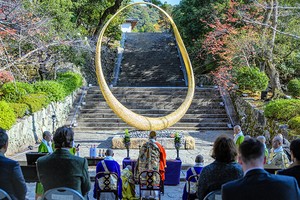THE ASAHI SHIMBUN
June 14, 2023 at 18:23 JST
Calls are growing for legislation to halt an online form of extortion that punishes nonpaying business operators, such as restaurants, with a barrage of negative reviews.
“This is a new business practice that exploits cyberspace,” said Harumichi Yuasa, a professor at Meiji University specializing in cybercrime issues.
An “izakaya” Japanese-style pub located across from the Aomori prefectural government building said it fell victim to the practice.
Around mid-April, the pub began receiving phone calls from a man who asked, “Would you like to receive a service to improve your review ratings and appear higher in search results?”
Such calls were made about twice a week.
Yasushi Sakuraba, 35, the owner of the izakaya, always declined the offer, saying, “I’m not interested.”
On May 21, Sakuraba’s smartphone notification sound kept ringing every one to two minutes, informing him that a Google review about his pub was being posted.
About 40 reviews were posted in just one hour, many of them written in foreign languages. All the ratings were 1 out of 5.
The izakaya’s rating had been 4.6, but it plummeted to 2.4.
The caller had identified himself as working for a company with a name that seemed to be associated with Google, but that turned out to be fictitious.
Sakuraba believed the flood of negative reviews was an attempt to pressure him into agreeing to pay for the positive-review service.
Google apparently responded to the barrage and deleted the low-rated reviews. The izakaya’s overall rating returned to its original level.
However, Sakuraba said, “If these negative reviews remain, some restaurant owners may have no choice but to close their establishments or even pay money in response to solicitations.”
Yuasa said, “The same soliciting organization most likely used long-idle accounts in an attempt to force the restaurant to pay the money.”
Google told The Asahi Shimbun that “this issue has now been fixed.”
It said, “We carefully monitor for any fraudulent content 24/7 through a combination of operators and technology.”
Toshiya Bando, professor of civil law and consumer law at Kyoto Sangyo University, said businesses that provide high ratings in exchange for money do exist.
The Consumer Affairs Agency said the act of using such services to unfairly raise the ratings of one’s own establishment could be punishable as “stealth marketing” under regulations that are scheduled to take effect in October.
In another case, the manager of a mail-order company was issued a summary order and fined.
The company was found to have deliberately prompted users to write negative content in the review section of a competitor’s online shopping site, damaging its credibility.
“We are at a point in time when legislation is needed to prevent such malicious posts,” Bando said.
Some site operators say they check all reviews to prevent unfair and malevolent content.
Kakaku.com Inc., operator of the popular “Tabelog” restaurant review site, said it visually checks all reviews and examines whether they comply with regulations within 24 hours of their posting.
TripAdvisor, a travel site that provides reviews for a gourmet site called “Gurunavi,” said it checks all reviews through a combination of automated and manual screening.
The site operator said it immediately rejects posts suspected of being fake or containing offensive content or subjects them to stricter scrutiny.
(This article was written by Arata Mitsui and Hiroshi Nakano.)




















A peek through the music industry’s curtain at the producers who harnessed social media to help their idols go global.
A series based on diplomatic documents declassified by Japan’s Foreign Ministry
Here is a collection of first-hand accounts by “hibakusha” atomic bomb survivors.
Cooking experts, chefs and others involved in the field of food introduce their special recipes intertwined with their paths in life.
A series about Japanese-Americans and their memories of World War II